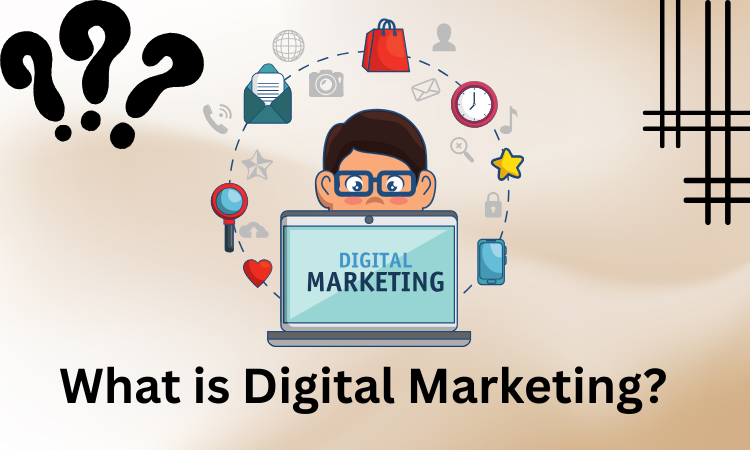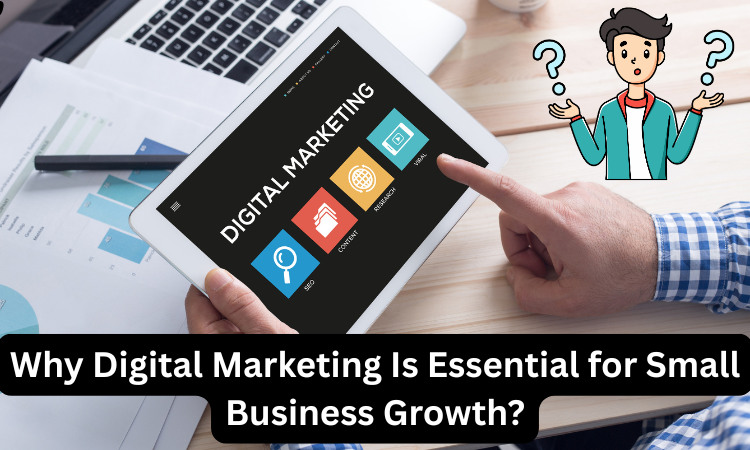Do you think your business is lost?
It is frustrating, right? Although all your promotion efforts have been successful, your marketing campaigns fail to target the right audience. The expense of using flyers combined with TV advertising does not guarantee successful promotion.
Don’t worry; here is some good news: Internet marketing is changing your small business strategy.
But how does it help?
- Targeted adverts target those who want what you sell.
- Track results in real time by knowing what works and what doesn’t.
- Even startups can be found with social media and SEO.
Digital marketing improves, reduces, and maximizes small business budgets. What matters is how your business reaches the correct individuals without wasting money.
How can digital marketing help? Read on to find out!
What is Digital Marketing?
A promotional concept known as digital marketing relies on technological systems and internet resources to market products or services. The approach functions through various strategies, which include:
- Search Engine Optimization (SEO)
- Social Media Marketing
- Email Marketing
- Content Marketing
- Paid Advertising (PPC)
- Affiliate Marketing
- Influencer Marketing
Businesses use internet-connected digital marketing services and devices to reach their target audience quickly. They do this to facilitate communication, engage their audience, and acquire consumer involvement.
Digital marketing lets businesses contact people worldwide in ways that older approaches can’t. Businesses may now contact users with personalized, ever-changing digital marketing strategies. It is achievable because more people utilize the internet.

Which Types of Small Businesses Are Relevant For Digital Marketing?
Every small business can reap rewards from digital marketing, though certain industries are better positioned online. These include:
E-commerce and Retail:
E-commerce and Retail stores that wish to increase their presence and reach a wider customer base can use digital marketing to reach customers and drive sales.
Service-based Businesses:
Those tiny deals, tiny print, and the generally small boys of service can readily use digital marketing to set up a favorable online presence and attract regional or global customers.
Health and Wellness:
Local SEO, content marketing, and social media marketing can help healthcare providers educate and potentially attract and engage clients through clinics, gyms, and health professionals.
Real Estate:
Real Estate Agents, property developers, and brokers need digital marketing to visualize and showcase properties, reach prospective buyers, and follow up on listings in a visually attractive and real-time manner.
Restaurants and Cafes:
Google My Business allows restaurants and cafes to fully control their online presence, run promotions, and learn from customers’ reviews to increase foot traffic and sales.
Professional Services:
Lawyers, accountants, and other professionals benefit from digital marketing, such as SEO, content marketing, and paid search engine advertising. Such marketing allows them to attract local clients and gain authority in their field.
Note: Small businesses need digital marketing to survive, be observed, and generate leads. A strong digital strategy can expand its reach.
Why is Digital Marketing Important for Small Businesses?
Digital marketing is essential for small businesses to compete with giant brands and grow. The following list emphasizes digital marketing.
Cost-Effectiveness:
Small companies send considerable funds to broadcast advertising platforms, including television stations, print media, and radio networks. Small businesses can use social networks combined with SEO and email marketing practices at budget-friendly costs.
Targeted Reach:
Digital marketing tools allow small firms to target specific client segments, increasing audience engagement. Business operators may optimize their Facebook, Google, and LinkedIn Ads campaigns by targeting geographic areas, user interests, and consumer behaviours.
Brand visibility increased:
A strong online presence helps potential buyers discover your products and services. Search engines, social networking, email promotion, and content creation help firms get seen.
Increased ROI:
Digital advertising platforms make more money than traditional marketing. Digital marketing allows organizations to track real-time performance indicators and improve campaign strategy.
Customer Engagement:
Through social media and digital channels, small businesses improve personal client engagement. Digital marketing enhances consumer bonds, which boosts customer retention and loyalty.
Decisions Based on Data:
Digital marketing provides analytical data to help organizations make informed decisions. Click-through Rate (CTR), Conversion Rate, and Customer Behavior studies help firms identify a marketing strategy’s operational strengths and weaknesses.
Global Reach:
Modern traditional marketing methods limit small firms to their local area. Through digital marketing, businesses may reach global audiences, increasing earnings potential.
Competitiveness:
Many tiny businesses face big businesses. Digital marketing tactics assist small firms in competing and acquiring market visibility.

Advantages of Digital Marketing for Small Businesses
- Increased Brand Awareness: Social media and SEO help small businesses attract customers. More online visibility means more customer prospects.
- Lead Generation: Lead generation comes from SEO, content marketing, and digital marketing techniques that drive consumers to websites or landing pages. Business converts leads into sales using strategic tools and tactics.
- Cost Savings: Lower digital marketing costs help low-budget small businesses optimize their finances. Internet advertising offers firms tremendous audience reach at a lower price than print, television, or radio.
- Access to analytics and data: Digital marketers can use analytics data to track campaign results in real time. Google information, social media insights, and email marketing tools provide performance information to help organizations make changes.
- Customer Relationship Building: Email marketing, social media, and direct communication enable client relationship growth. This approach increases customer loyalty, retention, and success.
- Revenue and Conversions: Retargeting and personalized email campaigns increase sales and conversions. Message-focused engagement can move customers down the sales funnel.
- Improved Customer Experience: Personalized interactions and experiences add value to your brand’s customer engagement. Smooth customer interactions on your digital channels will boost customer satisfaction and brand loyalty.
- Global Exposure: Digital marketing allows organizations to market their products globally, which is a huge benefit. Small businesses that want to develop globally profit greatly from this skill.
How Does Digital Marketing Help Small Businesses Achieve High Return on Investment (ROI)?
| Digital Marketing Channel | Average ROI (%) | Why It Works for Small Businesses | Source |
| Email Marketing | 4,400% | Affordable, targeted, personal customer communication. | WebsiteBuilderExpert |
| Search Engine Optimization (SEO) | 200% – 500% | Organic results boost website traffic over time. | WebsiteBuilderExpert |
| Social Media Marketing | 100% – 200% | Improves brand visibility, customer loyalty, and community. | Marketful |
| Pay-Per-Click (PPC) Advertising | 200% | Timely, measurable, and targeted ads. | WordStream |
| Content Marketing | 300% – 700% | It generates organic traffic, leads, and authority. | Marketful |
Tips for Digital Marketing for Small Businesses
- Create a Professional Website with Brand, Product, and Service Information for a strong online presence. Maintain a mobile-friendly platform with SEO-enabled navigation.
- SEO best practices for investment will boost your website’s rating. This method will increase your business’s visibility in related search engine results, helping potential customers find you.
- Start social media accounts on your main customers’ platforms. Periodically publish valuable content for your audience and communicate with your followers.
- Your company should create valuable blog entries, videos, and infographics for customers. Sharing useful ideas, how-to guides, industry reports, and case studies drives organic traffic to your platform and builds your authority.
- Build a subscriber list before launching one-to-one email campaigns. This marketing strategy lets you promote new products and follow leads multiple times, keeping your audience engaged.
- Paid advertising involves Google Ads and social media advertising to reach new customers.
- Google Analytics should be used to track and evaluate digital marketing campaigns. Conversion numbers and major metrics should be used to measure audience data and establish performance goals.
- For best results, keep your digital marketing consistent. Continuous involvement and a constant content-posting schedule keep your audience aware of your digital presence.

Take Your Small Business to the Next Level with Brandout
Running a small business comes with daily challenges and marketing shouldn’t be one of them.
Brandout offers a professional digital marketing service designed to help small businesses grow steadily and reach the right audience.
From strategy to execution, we focus on what works. Let us handle the online side while you focus on running your business.
Conclusion
To survive, small businesses must use digital marketing. They achieve market leadership by implementing strategic approaches that allow them to connect with customers throughout broader territories to increase their revenue.
Small businesses construct robust digital presences that promote expansion and continued success by combining SEO practices, social media approaches, and content marketing with digital tools.
Most Asked Questions About Digital Marketing for Small Businesses
Which action starts small business digital marketing?
Digital marketing relies on great websites and social media accounts. After establishing your internet presence, you create a digital marketing plan.
What does digital marketing cost small businesses?
Your business goals and digital marketing methods determine digital marketing costs. Online marketing costs less than traditional marketing, so small businesses can start with small amounts and grow as needed.
Do digital marketing strategies boost small business sales?
Digital marketing strategies deliver successful results in lead creation and customer boost efforts. Small businesses gain new customers through SEO, social media, and email marketing and boost sales.
How does social media benefit small businesses?
Absolutely. Small companies can use social media to display their products to customers, improving brand recognition and customer bond strength.
Can digital marketing help small businesses financially?
You can readily quantify the success of your digital marketing activities; therefore, your investment usually pays off. Because digital marketing allows real-time optimization, budget consumption is efficient and productive.




